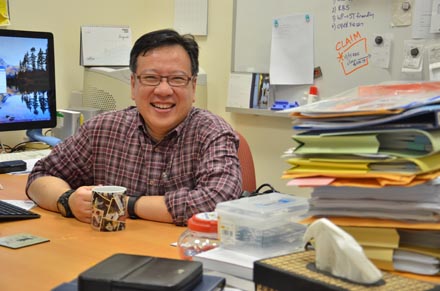Young Children’s Voices in Mathematical Problem Solving
Contributed by Dr Ho Siew Yin and Sng Wei Qin Abbie, from NTUC First Campus, for SingTeach Virtual […]
Read More
Are good teachers and teaching the keys to classroom improvement? While those factors do contribute to effective teaching and learning, guest editor of this issue Dr Dennis Kwek also believes that beyond just the person (teacher) and the act (teaching) lies the heart of truly effective classrooms – the instructional core. He shares with us what that is and how it affects both teaching and learning.

Guest Editor Dennis Kwek finds that learning can take place in any environment and situation, as long as there is a teacher, a learner and content.
Imagine the comfort of a home: A mother teaches her young child to speak a certain language. Bring it back to the classroom and the scene is not any different – a teacher teaches the students a particular subject or topic.
“No matter how and where you look at them, learning happens at any environment and situation, and the factors involved in every learning are always the same three – the knowledgeable other (teacher), learner (student) and content (topic),” explains Dennis who is also the Programme Director of the Schools, Leadership and System Studies Priority Area of Research in the Centre for Research in Pedagogy and Practice. “That is essentially what is known as the instructional core.”
It is the heart of all teaching and learning, to put it simply.
Leading NIE’s CORE Research Programme, Dennis and his research team aim to observe, analyse and understand what happens in Singapore classrooms. “To understand instructional core, we look very closely at how teachers work with students in helping the latter acquire knowledge,” he explains.
But more than just looking at how our teachers conduct lessons, it is the interaction between teachers and students, teachers and content, and students and content that makes the research interesting and important.
How do teachers interact with students? How do teachers design the content to make it interesting for students? How do students engage with those content and acquire knowledge?
“So to understand the instructional core, we aim to answer three questions – how teachers teach, why they teach the way they do and how students learn,” Dennis shares. “As such, these questions are the underlying philosophies of what the CORE Research Programme at NIE is about since 2004.”
“To understand the instructional core, we aim to answer three questions – how teachers teach, why they teach the way they do and how students learn.”
– Dennis Kwek, on what instructional core is in a nutshell
What happens after Dennis and his team observe and analyse Singapore classroom practices?
“While we can’t directly improve teaching practices, we hope to help teachers re-look at the way they teach to enhance their students’ learning,” he says. “We want to give back to teachers a range of resources that can help in their teaching.”
One way to do that is through the videos of the classroom that the team recorded in the duration of the programme. The researchers will watch these videos with the teachers involved and discuss about the various things that the teachers have done well and areas where improvements can be made.
“These videos serve as a reflective platform for teachers who will work closely with our team of researchers that consists of both former teachers and teaching fellows,” Dennis adds.
“Learning happens at any environment and situation, and the factors involved in every learning are always the same three – the knowledgeable other (teacher), learner (student) and content (topic); this is essentially what is known as the instructional core.”
– Dennis, on the three essential and constant factors that are present each time learning takes place
While instructional core is at the heart of teaching and learning, making an impact – albeit gradually – in Singapore classrooms is something Dennis has been hoping to achieve since the onset of the CORE Research Programme.
At the beginning of the programme, the team focused on informing education policies based on their research findings. “Today however, we are not only informing policymakers but also curriculum designers during curriculum reviews which happen every 6 years,” Dennis shares.
At the same time, the team is also exploring how they can inform teacher training programmes at NIE. They are also working closely with Master Teachers from the Academy of Singapore Teachers (AST) to translate research findings into professional development materials for teachers.
“The idea behind this plan is that, we hope to see changes in the instructional core because of either the teacher training programmes at NIE or our work with AST,” Dennis adds.
True to its name, the CORE Research Programme is indeed a study that is important and fundamental to Singapore’s education system. With reflective practitioners who are well-equipped with the know-hows of classroom instructions, teaching and learning can definitely be more effective.
Reference
Gall, M. (1970). The use of questions in teaching. Review of Educational Research, 40(5), 707–721.